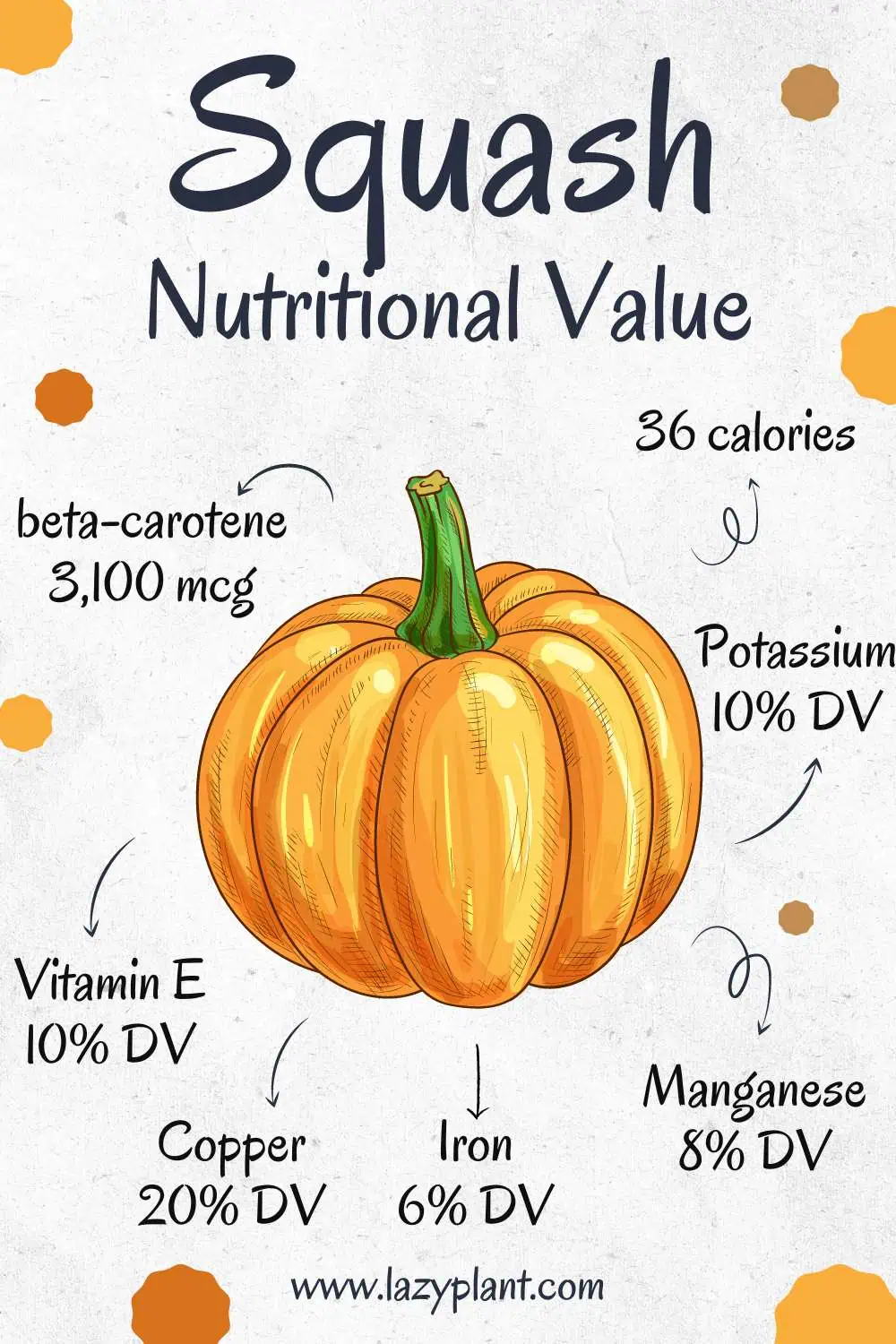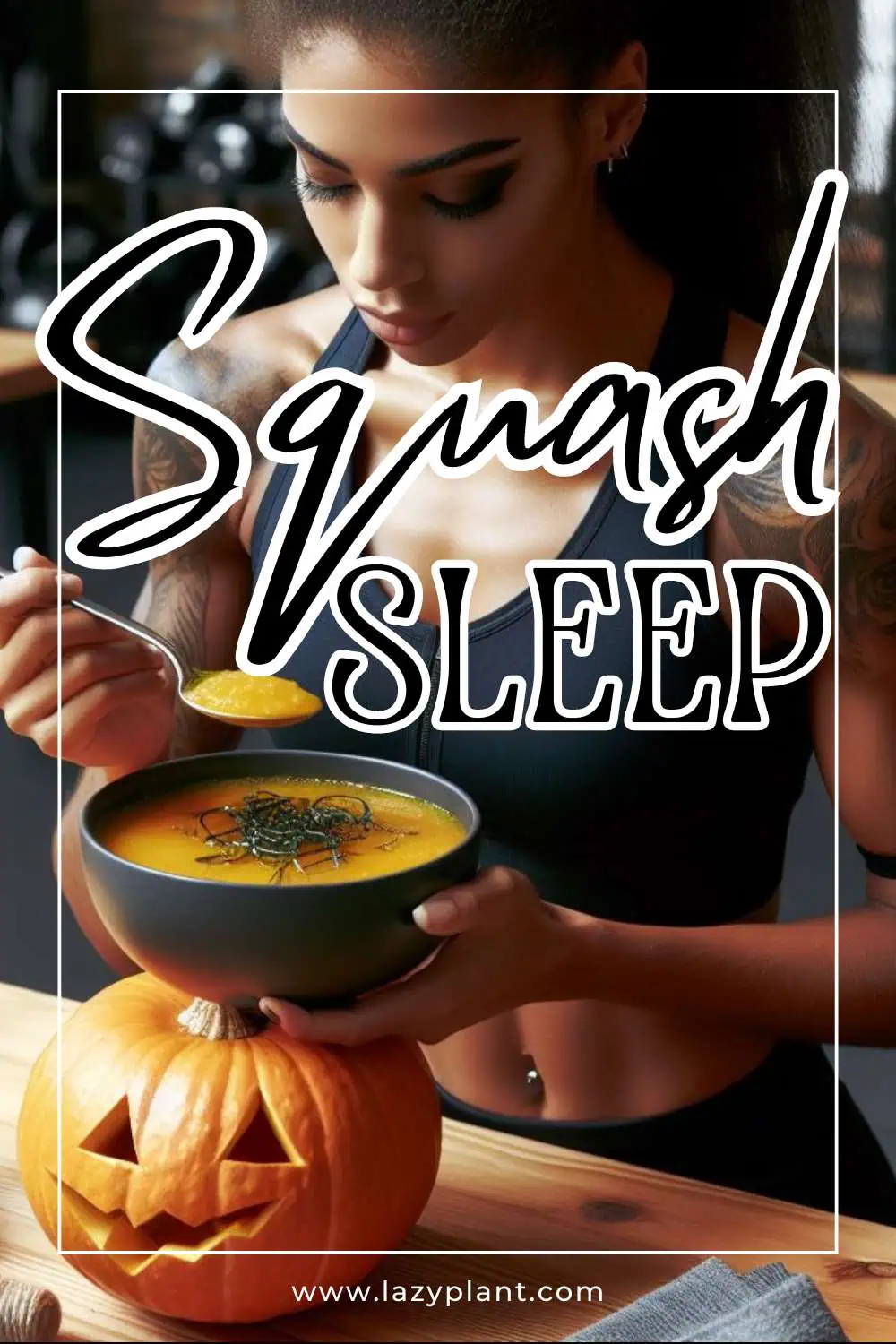Squash is an excellent food option for a light dinner. It’s easily digested, it has a few calories, and it’s packed with compounds that play beneficial roles in sleep onset, duration, and quality. Skyrocket your intake of these nutrients by consuming pumpkin seeds. These are among the most nutrient-dense foods you can eat every day before bedtime.
Nutritional Value of Squash & Pumpkin Seeds
Squash and especially pumpkin seeds are packed with minerals, vitamins, and other phytonutrients that support a good night’s sleep.
| Nutrient | % DV Squash | % DV Pumpkin Seeds |
|---|---|---|
| manganese (mg) | 7,6% | 56% |
| phosphorus (mg) | 8,8% | 50% |
| copper (mg) | 20% | 42% |
| magnesium (mg) | 4% | 40% |
| tryptophan (g) | 4% | 38% |
| zinc (mg) | 4,1% | 20% |
| iron (mg) | 6,2% | 14% |
| calories | 2% | 8% |
| potassium (mg) | 10% | 5% |
| selenium (mcg) | 0% | 4,8% |
| vitamin E (mg) | 9,9% | 4,1% |
| choline (mg) | 2,1% | 3,2% |
| calcium (mg) | 2,9% | 1,3% |
| vitamin K (mcg) | 1,3% | N/A |
| vitamin C (mg) | 14% | N/A |
| riboflavin (mg) | 11,8% | N/A |
| pantothenic acid (mg) | 8,3% | N/A |
| thiamine (mg) | 5,8% | N/A |
| folate (mcg) | 5,6% | N/A |
| niacin (mg) | 5,3% | N/A |
| vitamin B6 (mg) | 5% | N/A |
The nutritional value of each squash cultivar significantly varies, though. Among others, it depends on variety, soil, agricultural practices, region, cooking, processing, and storing methods.
Benefits of Squash & Pumpkin Seeds for Sleep
Support Nervous System
Magnesium is crucial for regulating GABA, a neurotransmitter promoting relaxation and sleep, while folate, niacin, and other B vitamins are involved in the synthesis of neurotransmitters like serotonin, which can influence sleep patterns. Magnesium deficiency, in particular, is linked to sleep disturbances.
Vitamin B6 plays a role in melatonin production, the hormone regulating sleep-wake cycles.
Regulate Sleep Hormones
Furthermore, you can consume pumpkin seeds at night, as they may help you sleep better. They’re rich in tryptophan, an essential amino acid that improves sleep quality. Tryptophan is vital for the production of melatonin, which is known as the sleep hormone.[2]
Actually, pumpkin seeds are among the richest foods in tryptophan, with a 1-oz serving providing more than 38% DV.

Zinc in squash is also necessary for the metabolism of melatonin, helping maintain a healthy circadian rhythm and improve sleep quality.
Copper is involved in the synthesis of neurotransmitters like dopamine and norepinephrine, which play roles in sleep-wake cycles. Copper deficiency may impact sleep quality.
Relax the Muscles
Along with its role in neurotransmitter function, magnesium also supports muscle relaxation, which can benefit sleep quality. Magnesium deficiency is one of the most common factors for the prevalence of insomnia.[3]
If you don’t regularly consume foods high in magnesium and have a hard time falling asleep, you might consider taking a magnesium supplement. You’ll find a wide variety on iHerb.
Remember that the richest foods in magnesium are those which are also high in fiber. Meat is the richest dietary source among animal-based foods. Almost 50% of Americans get less magnesium than their requirements!
Relieve Stress
Magnesium plays a crucial role in various biochemical reactions in the body, including those involved in the stress response system. Magnesium helps regulate important neurotransmitters for mood and stress management, such as serotonin.
Additionally, magnesium can help relax muscles and promote a sense of calmness, which can be beneficial during stressful periods.
Regular exercise and stress-reducing activities like spending time in nature or engaging in hobbies could also make all the difference in reducing anxiety.
Antioxidant Activity
Vitamins C and E in squash help reduce oxidative stress, which can contribute to sleep disturbances, while zinc plays a role in cellular repair processes, which are important for overall health and potentially sleep quality.
Squash is also among the richest foods in carotenoids. It’s packed with beta-carotene, lutein, and zeaxanthin. While primarily known for their roles in eye health, these antioxidants may indirectly support sleep quality by reducing oxidative stress and inflammation, which can interfere with sleep patterns.[4]
Oxidative stress can disrupt sleep patterns.
Improve Sleep Duration
Iron is essential for transporting oxygen throughout the body, including to the brain.
Iron deficiency can lead to fatigue and restless sleep due to reduced oxygen delivery to tissues. Optimal iron levels may help prevent restless leg syndrome and periodic limb movements, which can disrupt sleep and lead to fragmented sleep patterns.
Moreover, folate (vitamin B9) works in conjunction with other B vitamins to regulate homocysteine levels, which, when elevated, may interfere with sleep quality and most importantly, substantially increase the risk of cardiovascular disease. Adequate folate levels may contribute to longer, uninterrupted sleep.

Other Body Functions
B vitamin, including thiamine, riboflavin, niacin, and pantothenic acid support cellular energy production, which indirectly impacts overall sleep quality.
While not directly linked to sleep, manganese contributes to overall health by supporting various enzyme systems in the body. Its role in metabolism indirectly affects energy levels and overall well-being, which can influence sleep quality.
How much should I eat?
As a rule of thumb, you should aim for a serving size of 1 cup (cooked) of squash. This provides a good balance of nutrients and fiber without being excessive. Certainly, you could eat much higher amounts, as squash has a few calories. However, it’s preferable to consume other vegetables in order to get more phytonutrients.
There is no question that pumpkin seeds are among the most nutrient-dense foods you can consume. But just a 1-oz serving has about 160 calories. Be mindful of portion size if you’re on a diet. Half a handful of pumpkin seeds at dinner supports a good night’s sleep and boosts energy metabolism.
Both squash and pumpkin seeds enhance weight loss in many ways.
How long before bedtime should I have Dinner?
Aim for 3 hours between dinner and bedtime. This allows your body sufficient time to digest your meal before sleep. Digestion can interfere with sleep quality, causing discomfort or even acid reflux.
Some people might need a longer gap (up to 4 hours) between dinner and sleep if they experience heartburn or indigestion easily.
Additionally, eating too close to bedtime might disrupt your body’s natural hormonal cycles that regulate hunger and satiety. This can lead to late-night snacking and potentially hinder weight loss efforts.
Conversely, those who tend to get hungry at night might benefit from a small, healthy snack before bed.
Keep in mind that a lighter dinner lower in fat and processed foods is generally digested faster compared to a heavy or spicy meal.
What’s the best time of the day to eat Squash?
There isn’t a single “best” time of day to eat squash specifically for sleep benefits. Focus on a balanced diet throughout the day and avoid heavy meals close to bedtime, regardless of the specific food.
Dinner Recipes & Snack Ideas
How to eat Squash for better Sleep?
Pair squash with other sleep-promoting foods like lean protein sources, healthy fats, and complex carbs for a balanced and satisfying meal.
Lean Protein Sources
- Chicken Breast: Baked or grilled chicken breast provides protein that helps regulate blood sugar levels and promotes satiety, preventing late-night hunger pangs.
- Fish: Salmon, tuna, or other fatty fish are rich in omega-3 fatty acids, which have been linked to improved sleep quality in some studies.
- Tofu or Tempeh: For vegetarian or vegan options, tofu or tempeh offer plant-based protein that can help you feel satisfied throughout the night.

Complex Carbs
- Quinoa: This whole grain is a complete protein source and provides sustained energy release, promoting better sleep. Quinoa is a superfood for weight loss!
- Brown Rice: Another complex carbohydrate option, brown rice offers sustained energy and keeps you feeling fuller for longer.
- Whole-Wheat Bread or Pasta: Opt for whole-wheat versions of bread or pasta for a source of complex carbohydrates that won’t cause a blood sugar spike before bed.
Healthy Fats
- Avocados: A source of healthy monounsaturated fats, avocados can promote satiety and potentially improve sleep quality.
- Olive Oil: Drizzle some olive oil on your roasted squash or use it in a salad dressing. Healthy fats can aid in nutrient absorption and among with polyphenols in extra virgin olive oil contribute to overall well-being. [BUY HERE]
- Nuts and Seeds: A small handful of almonds, walnuts, or chia seeds can add healthy fats, protein, and fiber to your meal, promoting better sleep.
Dinner Recipe Ideas
Follow a few ideas to get you started. Remember to focus on using fresh, whole ingredients and experiment with different flavors and spices to create healthy and delicious meals that promote better sleep.
Roasted Butternut Squash with Salmon and Quinoa: Roast cubed butternut squash with herbs and spices. Pair it with baked salmon and a side of fluffy quinoa for a protein and fiber-rich meal. Sprinkle with pumpkin seeds before serving.
Turkey and Vegetable Stir-Fry with Brown Rice: Use lean ground turkey for a quick stir-fry with colorful vegetables like bell peppers, broccoli, and zucchini. Serve it over brown rice and top with a sprinkle of roasted pumpkin seeds.
Chicken and Sweet Potato Skillet: Saute cubed chicken breast with chopped sweet potato, onions, and peppers. Season with your favorite spices and serve over a bed of spinach. Add a touch of sweetness with roasted butternut squash cubes and top with pumpkin seeds.
Lentil Soup with Butternut Squash and Whole-Wheat Bread: This hearty and comforting soup is packed with protein and fiber from lentils and butternut squash. Serve it with a slice of whole-wheat bread for a satisfying meal. Drizzle with olive oil and sprinkle with pumpkin seeds for added flavor.
Tofu Scramble with Roasted Vegetables and Whole-Wheat Toast: Saute crumbled tofu with turmeric, nutritional yeast, and chopped vegetables for a vegan protein scramble. Serve it on whole-wheat toast with roasted squash slices and a sprinkle of pumpkin seeds.
Quinoa Stuffed Peppers with Black Beans and Corn: Hollow out bell peppers and stuff them with a mixture of cooked quinoa, black beans, corn, diced tomatoes, and spices. Bake until tender and serve with a dollop of plain yogurt or sour cream. Top with chopped roasted squash and a sprinkle of pumpkin seeds.
Chicken Sausage and Veggie Sheet Pan Dinner: Toss sliced chicken sausage, chopped squash, broccoli florets, and red onion cubes with olive oil and herbs. Spread on a sheet pan and roast until cooked through. Easy cleanup and a flavorful dinner. Top with a sprinkle of pumpkin seeds before serving.

Creamy Tomato Pasta with Spinach and Squash: Prepare a simple tomato sauce with fresh or canned tomatoes and herbs. Toss cooked whole-wheat pasta with the sauce, spinach, and diced roasted squash. Top with grated Parmesan cheese and a sprinkle of pumpkin seeds.
Black Bean Burgers with Sweet Potato Fries and Avocado: For a plant-based option, make black bean burgers seasoned with your favorite spices. Bake or pan-fry them until cooked through. Serve them on whole-wheat buns with sliced avocado and a side of sweet potato fries which can be a healthy fast food for weight loss! Sprinkle the fries with pumpkin seeds for a satisfying crunch.
Turkey Chili with Kidney Beans and Corn: This hearty chili is perfect for a cozy night in. Simmer ground turkey with kidney beans, corn, diced tomatoes, and spices in a pot. Serve it with a dollop of plain yogurt or sour cream and a sprinkle of shredded cheese. Add chopped roasted squash for extra veggies and top with pumpkin seeds.
Egg and Vegetable Frittata with Whole-Wheat Toast: Saute your favorite vegetables like chopped spinach, mushrooms, and diced squash. Whisk eggs with a splash of milk and spices. Pour the egg mixture over the cooked vegetables in a skillet and cook until set. Serve with a slice of whole-wheat toast and a sprinkle of pumpkin seeds. Eggs are among the few foods that naturally contain vitamin D. Vitamin D might play a role in the production of melatonin. Furthermore, vitamin D deficiency has been associated with an increased risk of depression, which is a common risk factor for insomnia!
Other Tips to improve Sleep
Healthy Diet: Maintain a balanced diet and avoid heavy meals or sugary drinks before bed.
Relaxing Bedtime Routine: Develop a calming routine before bed, such as taking a warm bath, reading a book, or drinking a cup of chamomile tea.
Regular Sleep Schedule: Go to bed and wake up around the same time each day, even on weekends. This helps regulate your body’s natural sleep-wake cycle.
Create a Sleep-Conducive Environment: Ensure your bedroom is dark, quiet, cool, and clutter-free.
Limit Screen Time: Avoid using electronic devices like phones or laptops for at least an hour before bedtime. The blue light emitted from these devices can disrupt sleep patterns.
Regular Exercise: Engage in regular physical activity, but avoid strenuous workouts close to bedtime.